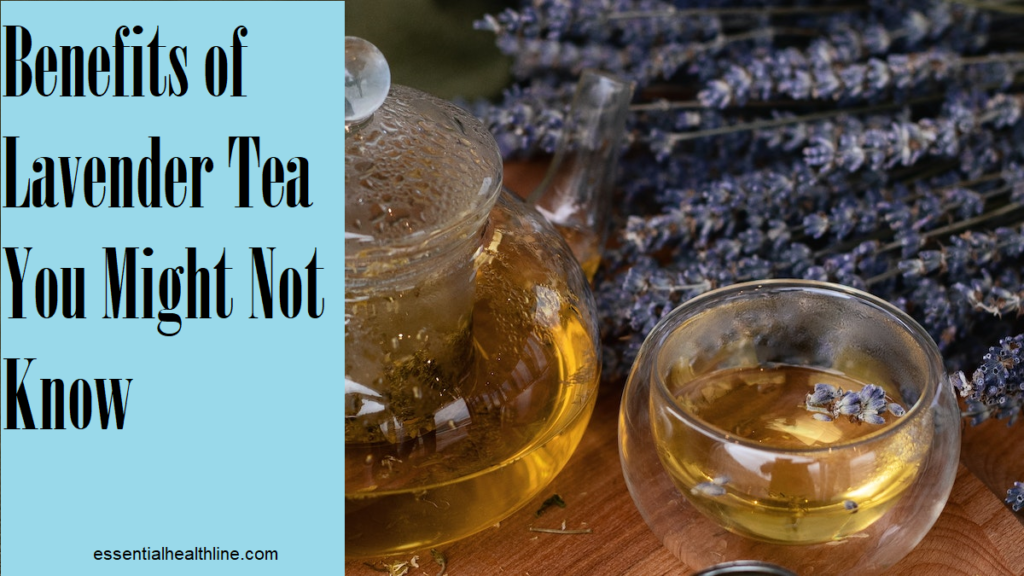Purple is often associated with nobility, power, royalty, ambition, and luxury. Such is the lavender plant! Besides the aromatic purple color of the lavender plant, have you thought about lavender tea? There are so many health benefits of lavender tea that you might not know about.
Well, lavender has many health benefits and is also used medically; for example, it treats headaches, joint and muscle pain, exhaustion, and skin diseases. Some benefits of lavender tea are improving sleep quality, promoting hair growth, lowering body pain, easing sunburn, and others. You can drink lavender tea in moderation, but if you’re pregnant, nursing a baby, or allergic to some herbs, first consult the doctor.
This article discusses the benefits of lavender tea and the medical uses of the lavender plant. So, you better read to the end!
But first…
What Is Lavender Tea?
Made from dried flowers or buds, lavender tea is herbal. There are approximately 39 species of lavender plant, also known as lavandula angustifolia. These species vary based on where they’re grown, but the most common species is the English lavender plant.
Lavender tea falls in the Lamiaceae botanical family as sage and mint do.
To make lavender tea, you must brew the lavender purple buds in hot water (I’ll share a recipe later). However, the lavender florals used to make the herbal tea must be properly dried; drying makes them more powerful in providing health benefits.
Besides, you only need a small amount to make a high-quality lavender tea when it’s dried.
7 Health Benefits Of Lavender Tea
Unfortunately, lavender tea has not entered many homes like black tea, coffee, lemon tea, etc.
But until you know the health benefits of lavender tea, you might be tempted to make it your daily beverage (we will look into how often you should take it later).
The benefits of lavender tea include:
- Sleep improvement
- Boosting immunity
- Lowering anxiety
- Relieving headache migraines
- Detoxifying the body
- Supporting the respiratory system
- Lowering premenstrual emotional symptoms
Keep reading as I discuss each of these benefits of lavender tea.
Sleep Improvement
How is your next day after a night of straining to sleep? Does it feel like it’s an exhausting day with a low mood? Absolutely!
Well, sleep is as essential as eating a healthy meal and doing body workouts to stay physically and emotionally healthy.
For decades, lavender tea has been known as a great sleep-improvement drink because it soothes the brain by stimulating responses in your nervous system. Stress is one of the major causes of lack of sleep, so when lavender tea soothes your brain, you enjoy a healthy, restful night of sound sleep.
Hence, if you want to enjoy the calming effects of lavender tea and have a high-quality sleep, take a cup an hour before bedtime. When you sleep sufficiently, you enjoy a productive day, your memory stays fresh all day, and your energy levels shoot.
Besides, as you enjoy lavender tea, you’ll also inhale its sweet aroma. Inhaling the lavender tea aroma benefits all people. Though lactating women shouldn’t take lavender tea, inhaling the aroma significantly benefits them as it lowers postpartum depression, hence sleeping better.
So, when a lactating woman inhales the lavender tea aroma for 2 months, she will sleep well. According to a study, taking 10 deep breaths of the aromatic lavender fragrance for 8 weeks, 4 days each week, could boost a young mother’s sleep.
Try it!
Boosting Immunity
When your immune system is under attack, your finances and job are equally affected. Hence, ensuring that your immune system is strong is a necessity. One way to ensure you’re guarding your immune system is by taking lavender tea.
Lavender plants have essential components such as geraniol, linalool, eucalyptol, linalyl acetate, and lavandulol that boost your immune health. Therefore, lavender tea has anti-inflammatory and antioxidant properties like honey and garlic.
Consequently, one of the health benefits of lavender tea is boosting your immune system.
So, taking lavender tea a few times a week could help keep doctors away as it triggers your immune system. What’s more?
As with green tomatoes, lavender tea also contains vitamin C, which effectively aids in warding off infections, and contains calcium and magnesium.
A cup of lavender is enough to keep off fungal and bacterial infections and other pathogens from your body.
Lowers Anxiety
Did you know that according to the World Health Organization, approximately 264 million people globally suffer from anxiety disorder? Of these 264 million, 2.6 percent is male, while 4.6 is female.
Just imagine how much these numbers can lower simply by taking lavender tea. Lavender tea contains lanolin, a calming property that helps boost your mood, lowering stress. These stress-relieving compounds, which may also be referred to as aromatherapy properties, ease depression and anxiety.
Though more research may be necessary, studies state that specific properties in lavender tea might aid in triggering some activities in your brain, thereby impacting the transmission of impulses between the cell brain.
Consequently, you get a soothing effect that boosts your mood.
Therefore, taking a cup of lavender tea could be the only thing you need daily to boost your emotional well-being if you’re experiencing frequent mood swings. Besides the health benefits of lavender tea when taken orally, the flavor is also beneficial during mood fluctuation as it calms the nervous system.
When your nervous system is calm, you feel relaxed and calm.
Relieves Migraines
Are you having migraines? Migraine relief is one of the many health benefits of lavender tea due to its analgesic properties.
You know you have a migraine if you feel fatigued, experience throbbing pain on the head (one side), have nausea and become sensitive to sounds and light. A headache, on the other hand, is tightness or pressure in your head. Migraines, though, might last longer and be more severe than headaches.
Sadly, a headache and migraines can paralyze an entire day’s activities. Lavender tea is a known natural remedy for headaches and migraines.
In a 2012 experiment involving 47 migraine patients, positive outcomes were noted due to the aromatherapy effects of lavender tea. Patients who inhaled the lavender tea aroma for at least 15 minutes noticed decreased headache pain and migraines.
The ability of lavender tea to relieve headaches and migraines could also be attributed to its soothing power on the nervous system. So, headaches arising from stress and depression could instantly ease after taking or inhaling lavender.
Detoxification
One of the major advantages and health benefits of lavender tea is the detoxification effect on your body. This is possible because lavender contains antioxidants, crucial in fighting oxidative stress from disease-causing toxins in your body.
If, therefore, you’re a smoker, work in a highly polluted zone, or drink alcohol, drink lavender tea occasionally to detox your body.
Otherwise, if you don’t detox your body, you could be at risk of some cancers or age quickly due to the free radicals in your body. But everyone needs to detox their bodies regardless of where they work because the world has become polluted, and we inhale contaminated air most of the time.
Supports the Respiratory System
Do you often have breathing problems? I have great news for you; lavender tea will open your airways.
When you sip lavender tea, take deep breaths to inhale its healing aroma that goes through your respiratory system unblocking the airways.
The antimicrobial and anti-inflammatory compounds in this healing tea support the recovery of the lungs and air pathways.
Lowers Premenstrual Emotional Symptoms
For most adolescents and young women, menstruation has never been easy, though it’s a blessing! At childbearing age, most women admit that they experience mood swings, severe abdominal pain, irritability, anxiety, and bloating during their menstruation.
For others, lower back pain and nausea accompany menstrual cramps.
If this is you, it’s time to clean a cup and enjoy the health benefits of lavender tea, which includes lowering premenstrual pain and discomfort.
I’m not saying that menstrual pain ceases entirely! But it lowers, which makes the cramping and menstruation days more bearable.
While taking lavender tea offers these incredible benefits, inhaling it works, too. Therefore, take deep breaths while taking the tea to relieve yourself of premenstrual tension (PMT).
The anti-inflammatory effects and analgesic compounds in terpenes and linalool relieve cramping, menstrual pain, and discomfort.
What Are The Benefits Of Lavender On Your Skin And Hair?
Aside from the health benefits of lavender tea, this extraordinary plant has health benefits on your skin and hair. The benefits include:
- Easing sunburn
- Boosting hair growth
In a minute or two, let’s discuss these lavender health benefits.
Eases Sunburn
Sunburn occurs due to too much sun, making your skin get hot and sore. Thanks to lavender, it eases sunburns. So, a mixer of aloe vera gel, peppermint essential oils, and lavender will treat sunburn effectively.
Boosting Hair Growth
Are you a lover of long, healthy hair like me? Use lavender oil. You might not see instant results, but after about 7 months, you should notice a significant change in your hair length and quality.
You could combine lavender oil with rosemary, cedarwood, and thyme oils for better and faster results. Not only will these oils impact health length, but they also prevent hair loss. If you have a hair loss problem, lavender oil will help it grow again.
| Product | Uses | Seller |
| Handcraft Lavender Essential Oil – 100% Pure and Natural | Blending With: Tea Tree, Eucalyptus, Peppermint, Basil, Lemon, Lemongrass, Bergamot, Rosemary, Eucalyptus, | Amazon |
| Lavender Multi-Use Oil | Great for the hair, face, and dry skin. | Amazon |
| Siva Lavender Essential Oil | Excellent for body massaging, skin, and nails. Great also for DIY soaps and aromatherapy candles. | Amazon |
Does Lavender Tea Have Side Effects?
Unfortunately, not everyone might enjoy lavender tea’s health benefits.
For some, lavender tea might have side effects such as:
- Drowsiness and sedation
- Allergies
- Gastrointestinal problems
- Drug interactions
- Hormonal Imbalance
Read on as I explain more.
Drowsiness and Sedation
Though, for some, there is a relaxing feeling after taking lavender tea, for some, they feel drowsy. Therefore, if you have never taken lavender tea, please avoid it before operating heavy machinery or driving your car.
Alternatively, only take it several hours before driving your car or operating heavy machinery. This way, you can examine your body and decide whether you’re in a good position to drive or operate machinery. Besides, the side effects of lavender tea should be lower after several hours.
Allergies
If, after taking lavender tea, you start experiencing breathing problems and have skin aches, rushes, or hives, stop retaking it.
You might as well want to avoid taking lavender tea if you’re allergic to honey. So, before taking this delicious tea, contact your doctor to know if it’s safe for you.
Gastrointestinal Problems
One of the adverse effects of lavender tea is a digestive problem. Though people with no issues with lavender tea might experience gastrointestinal problems when they take it in high amounts, people with allergic reactions are more prone to this problem.
Some gastrointestinal problems from lavender tea include vomiting, nausea, and diarrhea. For some, they might have a stomach upset. Since this is just a side effect, the symptoms cease a few hours after taking lavender tea.
So, unless the problem persists, you shouldn’t fret but also avoid lavender tea. Probably take lemon tea, as it has many health benefits, too.
Drug Interactions
Some medications might not interact well with lavender tea. Hence, it’s always advisable to inform the doctor that you’re taking lavender tea when he prescribes some medications, for example, blood thinner, sedative, and antidepressant medicine.
Also, according to the National Institutes of Health (NIH), taking sleep-inducing tablets such as Ambien, benzodiazepines, and barbiturates is dangerous. The same applies if you have high blood pressure and take losartan, enalapril, and captopril.
Taking lavender tea as you take these and some other medicines could have life-threatening effects on you.
Therefore, if you’re taking medicine every day or occasionally, don’t start taking lavender tea until the doctor has given you the go-ahead.
Hormonal Imbalance
The compounds in lavender tea that have weak estrogenic properties can interfere with your hormonal balance after continued use of lavender tea.
Generally, though, this might not be an issue for most lavender tea consumers. Still, for some, especially those with conditions sensitive to hormones, there might be some problems after taking lavender tea.
This explains why it’s unsafe for expectant mothers and adolescents (girls and boys) to take lavender tea.
Is It Good To Drink Lavender Tea Every Day?
While there are numerous known health benefits, it may be unsafe to take it every day. Take it in moderation, probably three times a week.
Taking lavender tea daily might cause headaches, high appetite, and constipation in most adults. You might therefore want to take pineapple juice in the morning, especially if it is hot instead of lavender tea.
Also, as mentioned in this article, pregnant mothers and adolescents should not drink lavender tea due to hormonal imbalance effects. This is just a precaution; no scientific evidence is attached to it.
5 Tips on How To Brew Good Lavender Tea At Home
Brewing lavender tea could give it a bad or sweet taste.
As goat meat cooked on low heat is sweet, so is lavender tea when brewed correctly. How do you brew lavender tea, therefore? Here are the tips for enjoying lavender tea’s health benefits when correctly brewed.
- Always use organically grown lavender plants when making tea due to the herbicides and pesticides that could be transferred into your tea.
- It’s safe to use fresh or dried lavender flower buds, but the dried flower buds give a better and top-quality tea.
- ‘Test the waters’ by taking only a small amount of lavender tea when starting, probably a teaspoon of lavender flower per cup of hot water. You can adjust the quantity as preferred if there are no side effects.
- Store lavender flowers in an airtight container to retain their aromatic flavor and store the container away from moisture and direct sunlight.
- Lavender tea bags don’t taste great, so use the florals.
Lavender Tea Recipe
Here are the ingredients you need to make lavender tea:
- 1 cup of water
- 1 teaspoon of dried lavender flowers
- 1 teaspoon honey (optional)
- Half a lemon (optional)
Method
- Bring the water to a boil
- Place a tea infuser over your pre-heat cup
- Pour your hot water into the cup and allow the mixture to sit for approximately 5 to 7 minutes to steep properly.
- Remove the tea infuser and dispose of the used lavender flowers
- If you want to have a sweet lavender tea, add 1 teaspoon of honey (or enough to taste)
- You could also add more flavor by squeezing the lemon juice into the tea
- Stir for a few seconds, and enjoy!
Parting Shot
Some of the primary health benefits of lavender tea include improving sleep and digestion. In addition, it helps you relax hence eliminating stress and depression, not to mention; it eases inflammation and menstrual pain.
In addition, lavender tea may help lower your body’s infections and boost your immune system.
So, unless you’re allergic, on medication, driving your car, or operating heavy machinery soon after taking it, prepare a hot lavender tea and enjoy. At least several times a week, not daily.



